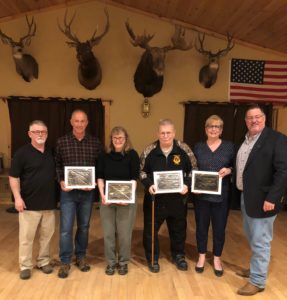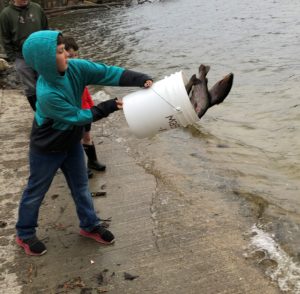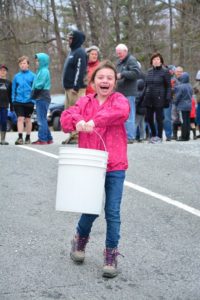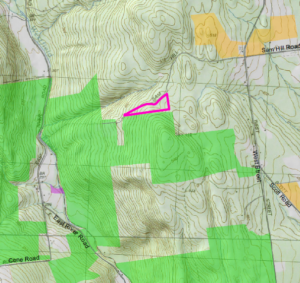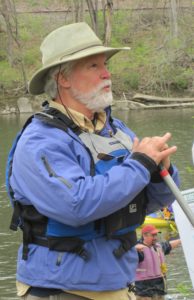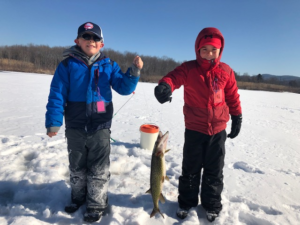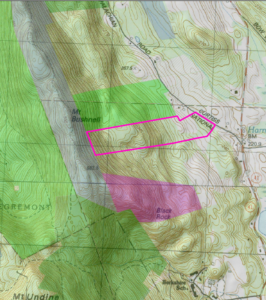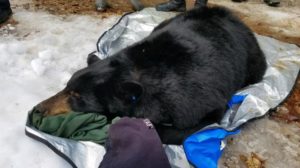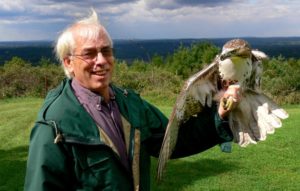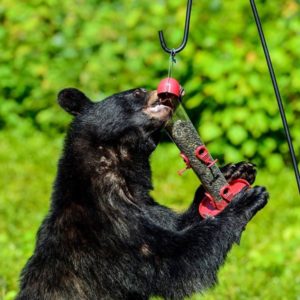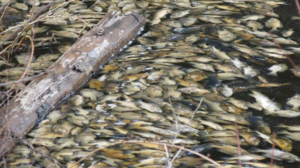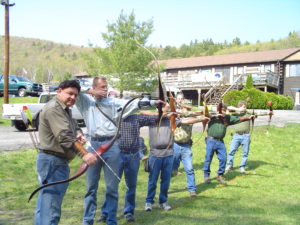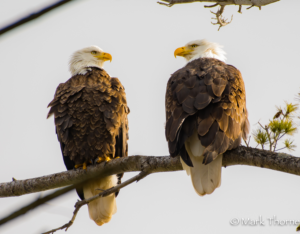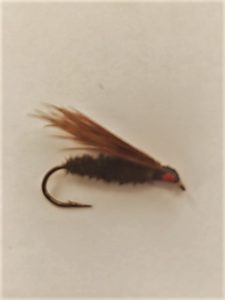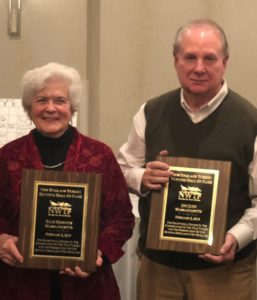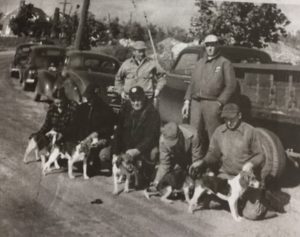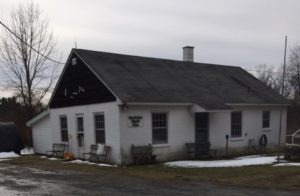The day started out on a dismal note. Early in the morning, the hunters had to contend with a steady rain downpour. After a couple of hours, the rain stopped and then a cold wind came up. That was followed around noon by a snow storm and snow squalls. Little did we know that things would even get worse that day.
I was at the Stockbridge Sportsmen’s Club hoping to get some pictures and hunting stories from the excited mentored youths. I was glad that I wasn’t out hunting in that miserable weather. Around 11:30 am, the mentors and youth hunters started arriving at the Club to enjoy a delicious casserole lunch prepared by Peter Delgrande. In spite of the bad weather, all of the hunters and mentors had seen, heard, shot at or killed turkeys. The first team in was Jardin Buffoni, hunting with mentor Jay Raifstranger who shot a tom weighing 20.24 lbs. Mark Buffoni, who was mentored by Bob Spence saw 5 turkeys but couldn’t bag any. No problem, for Mark already got one in neighboring NY. Matthew Fletcher hunting with Lori Fletcher saw toms and hens but didn’t shoot any. Bailey Gilmore, hunting with David Gilmore shot at one and saw others. Curt Wilson III, who was hunting with Mike Buffoni and John Mange saw some but couldn’t get one. Elaina Donsbough hunting with her dad Lee Donsbough got one (pictured).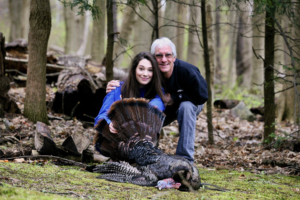
Around 12:30, the food was out and we were waiting for the last stragglers to come in from the hunt. Noticeably not present was Chris Puntin and his mentored youth. It was getting late, people had to go to games and what not, so Mike Buffoni told us not to wait for the others but to eat.
During the meal, we started to get reports of an accident somewhere. I remember thinking as I was driving home, I hope the accident wasn’t a serious one. I didn’t know if it was an auto accident or an accidental shooting. It wasn’t until later that evening that we learned that an apparent accidental shooting occurred and that Chris Puntin passed away.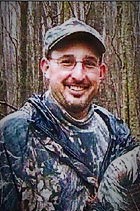
His wake was held at Bencivenga & Dagnoli Funeral Home on Thursday afternoon, and how sad it was. This scribe has personally never seen such a large wake. The line went out the door down to the rear of the long parking lot and back up on the other side. It was that long when I got there and when I left 3 hours later, it was still that long. Although the wake started at 4:00 pm, people stood for 3 – 3 ½ hours outside in the cloudy, misty but moderate weather well into darkness, with nary a complaint from anyone. Funeral home officials estimated the crowd to be between 1,500 and 1,600 and it ended at approximately 9:45 pm. I can only imagine the crowd that went to the funeral mass at Sacred Heart the following morning.
This should be of no surprise as Chris was well liked and respected as is his family. The Berkshire County League of Sportsmen (BCLS) sent a beautiful spray of flowers, interspersed with turkey feathers. Other sprays had similar feathers and also deer antlers.
MassWildlife also was saddened by the tragedy and extended its heartfelt sympathies to families and friends. To quote words from Andrew Madden, DFW Western District Supervisor, “Chris was well known to us. He was very active with the National Wild Turkey Federation (NWTF), a Paraplegic Deer Hunt volunteer for MassWildlife, and a good friend to the Agency and the District.”
Chris was an avid hunter and fisherman. He was the local chairman of the NWTF and served on the NWTF State Board. For many years he was a mentor for the youth turkey hunts and was a key organizer at the NWTF fund raisers. He helped in trout stockings and was a member of the Snow Seekers (tending snow mobile trails on October Mountain). He helped on the “Buddy Walks” by driving the tractor for its hayrides in Dalton (The Buddy Walk® was established in 1995 by the National Down Syndrome Society to celebrate Down Syndrome Awareness) and he volunteered as its “grill person”.
Words are hard to come by at times like this. I offer this meek consolation, that even though he was taken from us far too soon, he died doing what he truly loved right up to his last moment, that being getting the youth exposed to the outdoors and all it has to offer. I’m sure I speak for many local and Massachusetts sportsmen and women by offering up our sincerest condolences to his parents Willian and Mary Ellen, his son Nick, his life partner Carla Halley, other family members and friends. He will truly be missed.
Other than the information already provided, local harvest figures for the youth turkey hunt this year were hard to come by. No report was received from north county or from the Lee Sportsmen’s Association.
Travis Delratez (former president of the Pittsfield Sportsman Club) reported that his nephew Tristan Parsons shot a nice Tom on Saturday during the Youth Hunt. He said that it weighed 20+ lbs., had an 8 1/2-inch beard and 1-inch spurs.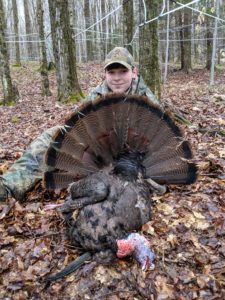 Tristan also shot another “long beard” the previous week in the NY Youth Hunt. Tristan has now bagged 5 long beards to date. He took another one in VT a couple of years ago. He has also shot two deer in his hunting career so far. Pretty good, ey? But get this, Tristan is only 13 years old!
Tristan also shot another “long beard” the previous week in the NY Youth Hunt. Tristan has now bagged 5 long beards to date. He took another one in VT a couple of years ago. He has also shot two deer in his hunting career so far. Pretty good, ey? But get this, Tristan is only 13 years old!
According to Marion Larson, Chief, Information & Education, MA DFW, some 44 harvested birds were reported online and there was at least one taken to a check station on Monday. This is only the preliminary number of birds harvested as they need to get further information from check stations on birds checked in on Monday the 29th. Final figures will be available at a later date.
Larson reported that statewide 70 new Youth Turkey Hunt participants completed the Youth Turkey Seminar and Hunter Education this year and 247 youths obtained permits for the youth turkey hunt day. (She doesn’t know how many actually hunted.) Just over 1,000 youths in total have participated in the Youth Turkey Hunt program since its inception in 2009.
Trout Stockings
The following local waters were scheduled to be stocked with trout last week. Rivers and brooks: Westfield River (West Branch) in Becket, Chester, Huntington and Middlefield; Deerfield River in Buckland, Charlemont and Florida; Hubbard River in Granville, Konkapot River in Monterey and New Marlborough, Kinderhook Creek in Hancock, Dry Brook in Adams and Cheshire, Green River (north) in Williamstown, Hemlock Brook in Williamstown, Pelham Brook in Charlemont and Rowe, Dunbar Brook in Monroe and South Brook in Cheshire.
Lakes and Ponds: Windsor Pond in Windsor, Windsor Lake in North Adams, Berry Pond in Hancock, Pelham Lake in Rowe, North Pond in Florida, Littleville Reservoir in Chester and Huntington and Plunkett Reservoir in Hinsdale.
Fishing Derbies
The Stockbridge Sportsmen’s Club is having its Spring Fishing Derby at the Stockbridge Bowl boat ramp next Sunday, May 19, from dawn until 3:00pm. Prizes of $100 will go the heaviest trout, pickerel, bass and bullhead. There will be free lures for all kids 12 and under. Hot breakfast and lunch will be available. Pre-registration fee is $10 and post registration is $15. Tickets are available at the Minkler Insurance Agency, 31 Main Street, Stockbridge, (W)413-644-3590, (H)413-298-4630 or from any club member.
DER Releases New Dam Removal Video
The Department of Environmental Restorations (MA DER) is excited to present Dam Removal in Pittsfield: Different Reasons, One Goal, a five-minute video about the upcoming removal of the Tel-Electric Dam on the West Branch of the Housatonic River. The video features City staff, the dam owners, and local partners. Together they make the case that the dam removal will restore river health, improve public safety, and build community resilience in Pittsfield.
This film is part of a multi-year endeavor, in partnership with the University of Massachusetts Amherst’s Science Media Collaborative. The project has culminated in a six-part film series entitled River Run – A Story of Dam Removal in Massachusetts. The films highlight the efforts by many of DER’s partners to advance river restoration projects across the Commonwealth. Be on the lookout for the additional five films that will be released later in 2019.

